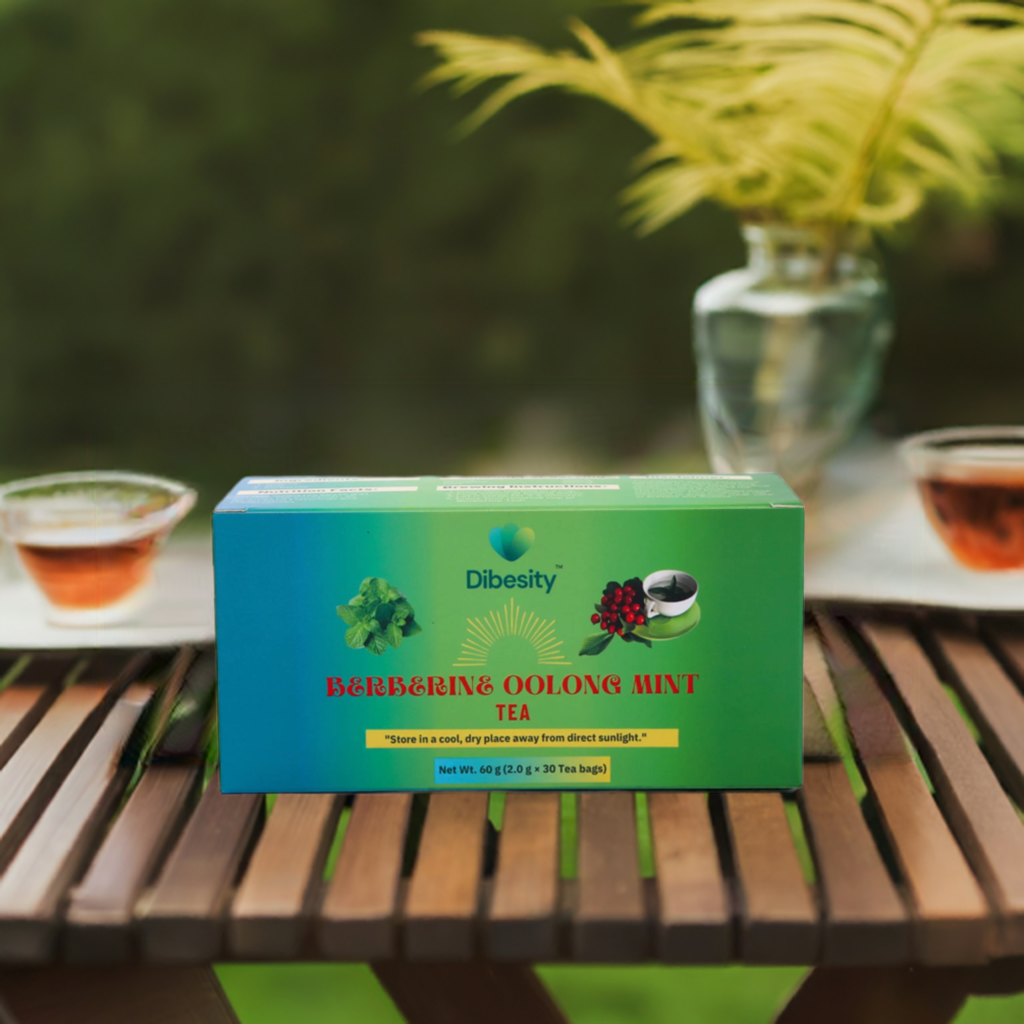Berberine tea is derived from the alkaloid compound known as berberine, which is commonly extracted from various plants, such as goldenseal, barberry, and Oregon grape.
This compound has been used for centuries in traditional medicine due to its numerous health benefits. The origins of berberine can be traced back to ancient Chinese medicine, where it has been utilized for its potential therapeutic properties. In recent years, it has gained significant traction in the wellness community, particularly among those interested in natural remedies and alternative health practices.
One of the primary reasons individuals are turning to tea as a method of consumption is its comforting and soothing qualities. By brewing berberine tea, users can enjoy the holistic benefits of this potent compound in a more palatable form.
The brewing process not only allows for easy absorption of the active ingredients but also enhances the overall experience of consuming berberine. Furthermore, the use of berberine tea bags can offer convenience, making it simple for individuals to integrate this health-promoting beverage into their daily routines.
The health benefits associated with berberine are diverse. Research indicates that it may assist in regulating blood sugar levels, supporting weight management, and promoting cardiovascular health. Additionally, berberine has demonstrated antimicrobial properties, making it a versatile component of natural health regimens.
With its array of potential advantages and a growing body of scientific support, brewing berberine tea has become an appealing choice for those seeking to enhance their wellness journey. As awareness of this remarkable compound expands, so too does the interest in effective and enjoyable methods of consumption, including preparing a delightful cup of berberine tea.
What is Berberine?
Berberine is a bioactive compound found in several plants, most notably in species like Goldenseal (Hydrastis canadensis) and Barberry (Berberis vulgaris). It is classified as an alkaloid, a group of naturally occurring molecules that often possess remarkable pharmacological properties. This compound is primarily recognized for its therapeutic potential, which has been widely examined in both traditional medicine and contemporary scientific research.
The interest in berberine has surged due to its array of health benefits, including its strong anti-inflammatory and antioxidant properties. Inflammation is a central factor in many chronic diseases, and finding means to mitigate this response is essential for overall health.
Similarly, oxidative stress, caused by an imbalance between free radicals and antioxidants in the body, can lead to cellular damage and is associated with a myriad of health issues. Berberine’s ability to combat oxidative stress has made it a subject of much interest among healthcare professionals and researchers.
In addition to its anti-inflammatory and antioxidant activity, berberine has been studied for its role in glucose metabolism and lipid regulation. It has become increasingly popular among those seeking to manage blood sugar levels, making it particularly relevant for individuals dealing with insulin resistance and type 2 diabetes. Furthermore, berberine’s effects on cholesterol levels contribute to cardiovascular health, offering yet another layer of benefit.
To harness these potential health benefits, many people are seeking ways to incorporate berberine into their daily routines, one effective method being through tea.
Understanding how to brew berberine tea, or brew berberine tea bags, allows individuals to enjoy these advantages in a more accessible form. As research continues to unfold, the significance of berberine in promoting overall wellness is gaining greater recognition.

Health Benefits of Berberine Tea
Berberine is a bioactive compound found in several plants, notably the barberry shrub, and has gained attention for its impressive health benefits. One of the primary advantages of consuming berberine, particularly in the form of berberine tea, is its potential to regulate blood sugar levels.
Numerous studies have indicated that berberine can improve insulin sensitivity and reduce glucose production in the liver, making it a popular complementary option for individuals managing type 2 diabetes or those at risk of developing it. By learning how to brew berberine tea, one can effectively incorporate this beneficial compound into their daily diet.
In addition to blood sugar regulation, berberine has also been linked to cholesterol management. Research suggests that berberine can help lower lipid levels, particularly LDL (low-density lipoprotein) cholesterol and triglycerides.
This effect not only promotes cardiovascular health but may also contribute to a decreased risk of heart disease. Various studies highlight the significance of berberine’s potential in managing cholesterol, showing that daily consumption of berberine tea may serve as a safe and effective approach toward maintaining healthy lipid levels.
Moreover, berberine is celebrated for its potential antimicrobial properties. Preliminary research has demonstrated that berberine exhibits activity against a range of pathogens, including bacteria, fungi, and certain parasites.
This characteristic adds another layer of appeal to berberine tea, as it may bolster the immune system and enhance overall health by fighting off infections. Considering these multiple health benefits, learning how to brew berberine tea and incorporating it into your routine may offer significant advantages for those seeking holistic wellness. The benefits of berberine tea promote not only individual health but also foster a proactive approach to wellbeing.

Gathering Berberine Tea Ingredients
Brewing an ideal cup of berberine tea begins with selecting high-quality ingredients. The primary component for this tea is, of course, berberine itself, which can be found in various forms, including herbal tea bags or loose herbs. When considering how to brew berberine tea, it’s essential to source berberine from reputable suppliers. Look for brands that provide detailed information about the sourcing and processing of the herbs used in their tea bags.
If you prefer a more traditional approach, you can look for fresh herbs like goldenseal or barberry, which naturally contain berberine. These can often be found at health food stores or specialized herb shops. When selecting berberine tea bags, check for certifications such as organic or non-GMO to ensure that you are consuming a product free from harmful chemicals.
Additionally, to enhance the flavor of berberine tea, consider adding natural sweeteners or mixers. Honey or fresh lemon juice are popular options that not only improve the taste but also offer their own health benefits. To achieve a balanced beverage, experiment with different ratios of berberine and these flavor enhancers until you find what best suits your palate.
It is also advisable to verify that the berberine products you choose are standardized for berberine content, as this ensures you are receiving an effective dose. Online marketplaces, health food stores, and herbal specialty shops are excellent locations to purchase quality berberine tea bags or loose herbs. By paying careful attention to ingredient quality and sourcing, you lay the groundwork for an enjoyable and beneficial tea experience.

Step-by-Step Brewing Instructions
Brewing berberine tea is a straightforward process that can be easily accomplished by following a few methodical steps. The key to ensuring a flavorful and beneficial cup of tea lies in the right quantities, water temperature, and steeping time. Here’s a comprehensive guide on how to brew berberine tea using tea bags.
Begin by gathering your ingredients and tools. You will need high-quality berberine tea bags, fresh filtered water, and a cup or teapot for brewing. It is advisable to use one tea bag for every cup of water. For a single serving, the general measurement is one tea bag for every 8 ounces of water.
Next, heat your water. The ideal temperature for brewing berberine tea is typically around 190°F to 200°F (88°C to 93°C). This temperature range ensures that the active compounds in the berberine are adequately extracted without compromising the flavor. Using a thermometer can help achieve this precision, but if you do not have one, bringing the water to a boil and letting it sit for a minute can often suffice.
Once your water reaches the correct temperature, place the tea bag in your cup or teapot and pour the hot water over it. Allow the tea to steep for approximately 5 to 7 minutes. During this time, the flavors and beneficial properties of the berberine will be released into the water. Taste periodically; if you prefer a stronger flavor, you can steep it for an additional minute or two. However, avoid overstaying the tea bag in the water, as this could lead to bitterness.
After steeping, remove the tea bag and enjoy your berberine tea. Feel free to enhance the flavor by adding lemon, honey or spices, according to your preference. By following these steps, you’ll have mastered how to brew berberine tea efficiently, making it a delightful addition to your wellness routine.
Enhancing the Flavor of Berberine Tea
Brewing berberine tea offers a unique taste that can be enhanced through various methods. Many individuals find that the naturally bitter flavor of berberine can be tempered by combining it with other herbal teas.
For example, mixing berberine tea bags with chamomile or peppermint can add a soothing aroma and pleasant taste that balances the bitterness. The floral notes of chamomile or the refreshing mint of peppermint not only improve the overall flavor profile but can also provide additional health benefits.
Another effective way to enhance the flavor of berberine tea is by incorporating natural sweeteners. Honey, for instance, can do wonders in mellowing the bitterness while providing its own health benefits.
Agave syrup and maple syrup are also excellent alternatives for those seeking a plant-based sweetener. Additionally, sweetening the tea with a little stevia or monk fruit can be appropriate options for those mindful of their caloric intake. Sweetness, however, should be added in moderation to avoid overshadowing the distinctive flavors of the berberine itself.
Spices can also play an instrumental role in enhancing the taste of berberine tea. Cinnamon, ginger, or cardamom can be added as they not only complement the flavor but also enrich the tea with their own health properties.
A pinch of cinnamon can create warmth and depth, while ginger introduces a spicy kick that can be invigorating. Adding a sprinkle of allspice or nutmeg might also create an exceptional flavor experience for those looking to brew berberine tea with a twist.
In conclusion, enhancing the flavor of berberine tea can significantly improve the drinking experience. By mixing with other herbal teas, utilizing natural sweeteners, and incorporating spices, individuals can create appealing and enjoyable beverages that allow them to reap the health benefits of berberine while enjoying every sip.
Tips for Storing Berberine Tea Bags
Caring for your berberine tea bags is crucial to preserving their freshness and potency. To begin with, the optimal storage conditions play a significant role in maintaining the quality of your tea. It is advisable to store berberine tea bags in a cool, dry place away from direct sunlight.
Excess moisture and heat can cause the tea to degrade more quickly, diminishing its flavor and health benefits. Ideally, aim for a pantry or a cupboard that has stable temperatures and is not subject to humidity fluctuations.
Airtight containers are highly recommended for storing berberine tea bags. The packaging should be sealed tightly to prevent exposure to air and moisture, both of which can lead to oxidation and spoilage. If the original packaging is not resealable, consider transferring the bags to an opaque, airtight container. This will help to shield the tea from light, which can also affect its quality over time.
Determining the shelf life of berberine tea bags is essential for ensuring optimal consumption. Most packaged tea bags have a shelf life of about 1-2 years if stored properly. However, over time, even well-preserved tea may lose its flavor and potency.
Therefore, it is wise to periodically examine your tea bags for any signs of deterioration. Look for changes in color, aroma, or texture; a noticeable decline indicates that it may be time to discard the tea. Additionally, if the tea has an unusual odor, or if the bags show any signs of mold or moisture, it’s advisable to err on the side of caution and dispose of them.
By following these storage recommendations, you can ensure that your berberine tea bags remain fresh and effective, ready for brewing when you need them most.
Potential Side Effects and Considerations
While berberine tea presents numerous health benefits, it is crucial to be mindful of potential side effects and interactions associated with its consumption. Berberine itself is a bioactive compound extracted from several plants, such as goldenseal and barberry, and is often consumed in tea form for its purported therapeutic properties. However, certain individuals may experience adverse reactions, particularly those with specific health conditions or who are taking medications.
One of the primary considerations involves individuals who are pregnant or breastfeeding. The effects of berberine on fetal development or infant health are not fully understood, and thus, it is advisable for these populations to refrain from consuming berberine tea without medical guidance.
Additionally, those with liver issues or other pre-existing health conditions should consult a healthcare professional before incorporating berberine into their diet, as the compound may potentially affect liver function.
Furthermore, berberine has a noticeable impact on blood sugar levels. While this is generally beneficial for individuals managing diabetes, it could lead to dangerously low blood sugar in those already on medications such as insulin or other hypoglycemics. Therefore, it is vital to monitor blood sugar levels closely when learning how to brew berberine tea or consume berberine tea bags, particularly if medications are involved.
Lastly, gastrointestinal discomfort is another side effect that some may encounter when consuming berberine tea. Symptoms might include diarrhea, constipation, or stomach cramps.
If such symptoms arise, it may be necessary to adjust the quantity of tea consumed or discontinue its use altogether. Overall, while berberine tea can be a valuable addition to one’s routine, ensuring safe consumption practices and being aware of potential side effects is paramount for optimal health.
Conclusion: Making Berberine Tea a Part of Your Routine
Incorporating berberine tea into your daily routine can be a rewarding endeavor, fostering both wellness and enjoyment. As we have explored throughout this guide, brewing berberine tea is a straightforward process that allows you to harness the myriad benefits associated with this remarkable herb. Whether you opt to brew berberine tea bags or prepare it from loose leaves, the versatility and accessibility of berberine tea make it a seamless addition to your lifestyle.
The benefits of berberine tea extend beyond its comforting flavor. Known for its potential to support metabolic health and contribute to overall well-being, berberine has gained recognition in the wellness community.
Regular consumption of this tea may aid in maintaining healthy blood sugar levels and promoting digestive health. These attributes underscore the importance of making berberine tea a staple in your diet, potentially enhancing your everyday health routine.
Moreover, brewing berberine tea can foster social Interaction and bonding experiences among family and friends. Preparing and sharing a pot of tea creates a moment of connection, allowing for meaningful conversations and shared well-being goals.
Whether enjoyed in solitude or in a gathering, berberine tea serves as a perfect vehicle for mindfulness and relaxation, encouraging a momentary pause in our fast-paced lives.
Ultimately, the integration of berberine tea can lead to a holistic approach to health that balances both the body and the mind. With its ease of preparation and numerous health benefits, this tea not only nourishes the body but also enriches our communal experiences around the act of enjoying tea. Take the step towards a healthier routine by exploring the delightful world of berberine tea today.


